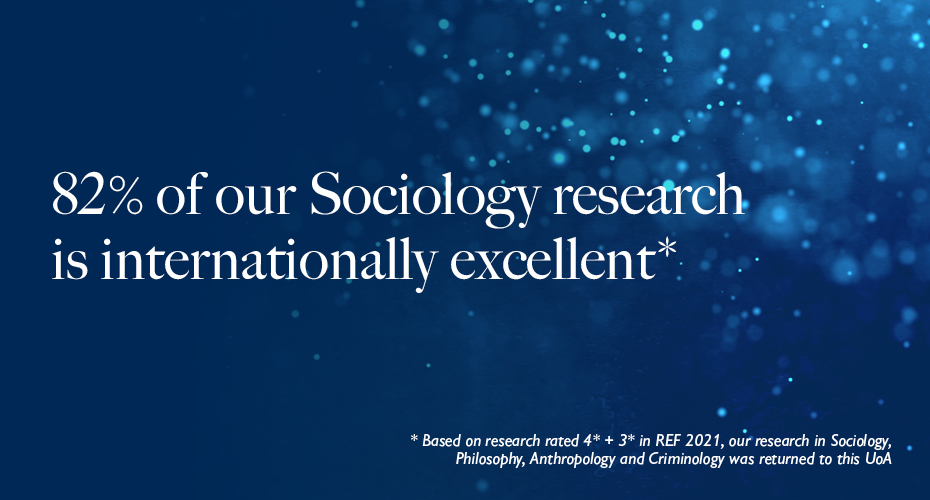Our research
About our research
Our internationally recognised research is grouped into six research clusters:
Crime, Violence and Policing draws together sociologists, anthropologists and criminologists that are concerned with practices of violence, including how it is defined, enacted, and reproduced. Much of this research addresses the intersection of violence and accountability: how it is rendered (in)visible, how violence and counter-violence interventions are evidenced, and how redress and justice can be promoted. Members of this Research Cluster play leading roles in the cross disciplinary Police and Evidence Group as well as the Policing Lab between Devon and Cornwall Police and the University of Exeter.
Lead: Dr. Abigail Dymond
In Culture and Ethics an emphasis is placed on cultural practices, on the production of differences and Otherness and on everyday ethics. The idea of culture as process is core, with, for example, a focus on art and music making in both youth and later-life and end of life settings - see SocArts. The cultural production of belonging and otherness is also explored across the UK, Europe and beyond through literature and marriage. Emphasis is also placed on how culture facilitates categories of identity. For example, how food is constructed as heritage and identity and how that becomes institutionalised as cultural categories representing European traditions and Anglo heritage. Attention is paid to how cultures of racism can come to co-exist with relations of conviviality, and how the social and political processes of Brexit and Covid-19 are shaping everyday identities and processes of belonging and non-belonging. Crucial to this cluster is an exploration of the ethical choices and moral judgements that constitute the everyday. Like culture, ethics is seen as a dynamic process, and the emphasis here is on ethics in practice with reference of moral change, emotion, language, virtue, legal, medical, biological and scientific practice and life purpose.
Lead: Prof. Katharine Tyler
The Health and (well)Being cluster focuses on diverse and interrelated aspects of human wellbeing, animal welfare and environmental health. The cluster advances research on dis/ability, meaning of life, measurement of wellbeing and happiness and on loneliness. These topics are examined through disciplinary, interdisciplinary and cross-cultural research that explores the production, transformation and impact of health care practices, institutions, technologies and systems. Within the Life Course sub-group, researchers work on how health is shaped by environments as well as interactions with institutions of global and public health. Multispecies Interaction explores an array of interactions that occur between members of different species ranging from microbes to humans and charismatic megafauna, often exploring cross-cultural understandings.
Researchers in the Inequalities, Marginality and Resistance cluster deploy a range of theoretical and empirical approaches to analysis of social relations and the production of inequalities, marginality and resistance. Inequalities are investigated using quantitative tools and focusing on such issues as education, reproductive behaviour, and ageing through the prisms of class, gender, ethnicity and race. Marginality is studied theoretically and through multiple ethnographies of humans and non-humans aiming to probe the experiences of identity and difference. Marginality is also studied philosophically, in terms of marginalisation of social and moral criticism. The link between inequality and power in contemporary Western societies is examined through the prism of feminist, critical and postcolonial theory and through studies of resistance movements and organisations in North and South.
Lead: Dr. Charlie Masquelier
Mind and Materiality facing staff share interests and expertise on questions about the nature of the mind, consciousness, embodiment, emotion, perception, memory, addiction and mental health. They draw on psychology, neuroscience, and psychiatry, alongside their philosophical, sociological and anthropological approaches, to address these topics. ‘Mind’ is situated within a broad cultural context, including intersubjective interactions, sociocultural practices, and material culture.
Research in the Science, Technology, Knowledge and Power cluster examines how science, technology and society intertwine, from multiple theoretical angles. Cluster members represent traditions drawn from anthropology, history, philosophy, science and technology studies and sociology. Researchers critically and creatively investigate and theorise diverse examples of innovation, sustainability, and engagement in scientific, technological and traditional knowledge practices. The Cluster builds on a longstanding sociological and philosophical heritage in the Department that focuses on the interrogation of knowledge and in the past has included the work of researchers such as Barry Barnes and Andrew Pickering. Methodological approaches include: long-term ethnographic studies of scientific laboratory practices; co-created approaches between sociological and design focussed researchers; embedded research. The Environments and Livelihoods sub-group studies human interaction with wider environments including agriculture, ecology, earth and ocean systems and intersects with the Centre for Rural Policy Research. Philosophy of biology studies the nature, investigation and meaning of life processes and intersects with the Egenis Centre.
Our research is underpinned by expertise in Data Studies.
Lead: Prof. Mike Michael
| When | Time | Description |
|---|---|---|
| 12 - 13 August 2024 | 9:30 | Workshop "Philosophy of the Paleosciences" Full details |
| 11 September 2024 | 19:00 | Building resilient rural communities: is there a looming rural mental health crisis? Full details |
| 30 October 2024 | 10:45 | Full details |





